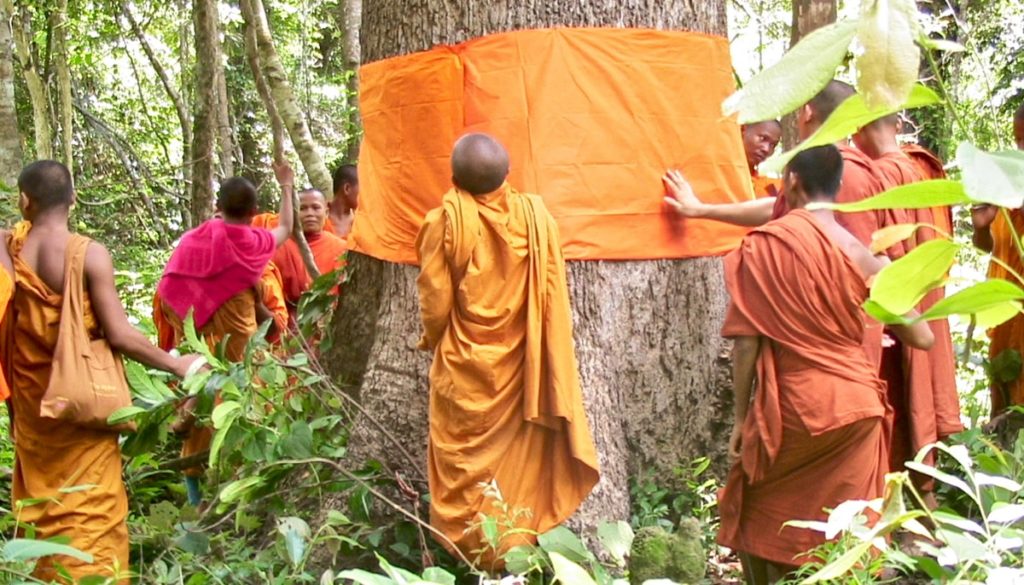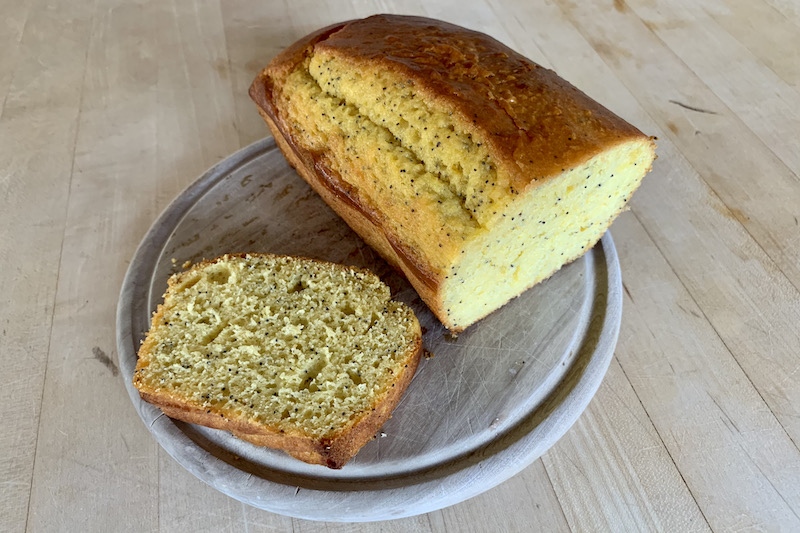02021-01-13 | Uncategorized
My favorite line from the previous post is this one:
In Thailand, the “Forest Monk” Prachak “ordained” trees in the forest by wrapping monks’ robes around them to save them from loggers.
What a beautiful idea that is. I searched and learned that the practice to ordain trees is now going on in Sri Lanka and Cambodia in addition to Thailand. Here is an image I found on this webpage:

02021-01-13 | Uncategorized
I asked Roshi Joan Halifax, the abbott of Upaya in Santa Fe, to write a few words to explain what Engaged Buddhism is and she sent me the following text:
Engaged Buddhism during our lifetime is represented by those courageous Buddhists who apply insights from meditation practice, precepts, and dharma teachings to situations of social, political, environmental, and economic suffering and injustice. Some of the principle leaders are Thich Nhat Hanh, Sulak Sivaraksa of Thailand, T. Ariyaratne of Sri Lanka. These socially engaged Buddhist leaders have campaigned relentlessly, organized millions of new converts, faced death threats, been imprisoned, founded schools and universities, and produced a huge new Buddhist literature to restore social, environmental, and economic justice to their societies.
For example, Dr. A. T. Ariyaratne began his work years ago with his social paramis and an extensive reinterpretation within a social context of basic Buddhist teachings. The Sarvodaya Movement works in a thousand or more villages to empower the poor.
Thich Nhat Hanh and Sulak Sivaraksa did something similar when they first began looking at precepts or sila through a social lens. Thay himself called on both North and South Vietnam to stop the bloodshed. Maha Ghosananda, a revered Cambodian Buddhist monk, led thousands in peaceful walks through the “killing fields” to seek reconciliation with the Khmer Rouge. In Thailand, the “Forest Monk” Prachak “ordained” trees in the forest by wrapping monks’ robes around them to save them from loggers. The Taiwan-based Tzu-Chi movement has thousands of volunteers who respond to natural and man-made disasters. The American social justice activist and Zen teacher Robert Aitken Roshi with the establishment of the Buddhist Peace Fellowship; environmental and peace activist Joanna Macy and her Work that Reconnects; and His Holiness the Dalai Lama and his dedication to secular ethics and compassionate action.
Many of us have followed these footsteps, including Roshis Bernie Glassman and Jishu Angyo Holmes and their Zen Peacemaker Order; Jon Watt’s and his social kandhas, an anti-consumerism political paticca samupada; Santikaro Bhikkhu’s “Four Noble Truths of Dhammic Socialism;” Sensei Alan Senauke and his work in the prison system and with Rohingya refugees; Diana Winston and her BASE program; and myself with Upaya Zen Center as a platform for social and environmental responsibility and action. More recently, Bikkhu Analāyo, who addresses Buddhist responsibility to speak out against racism in light of the Black Lives Matter movement.
Also important is the Buddhist Perspective on leadership as outlined in the Dasavidha-Rājadhamma: The Ten qualities for a leader to cultivate and possess articulated in the Dasavidha-Rajadhamma are ones that current leaders and polity would do well to cultivate: generosity; ethics; altruism/unselfishness; integrity/honesty; gentleness; self-restraint; non-anger; non-violence, non-oppression; patience; uprightness: being congruent with what will truly benefit others.
Those qualities advocated in the Dasavidha-Rajadhamma are qualities cultivated through deep practice and the presence of developed moral sensitivity. I would suggest that this is why socially engaged Buddhism is so important at this time in our world. Although the Buddha was socially engaged, relatively speaking, we now have a bigger, more ecologically and socially consequential field to repair and cultivate.
Dr. Cynda Rushton shared some guidelines on integrity during a recent Upaya Buddhist chaplaincy training program. These are interesting to consider as they reflect an inner discernment process that could help us to keep aligned with our values: I know what I stand for; I live my values; I inquire and am curious to discover what will serve; I ask the hard questions; I speak out for what I stand for; I listen to the call of conscience; I am courageous despite risks; I take principled action or inaction; I am responsible and accountable.
Another thing to note in relation to contemporary socially engaged Buddhism and the importance of current protest movements, Thich Nhat Hanh in the “The Ninth Mindfulness Training” on truthful and loving speech in his Order of Interbeing makes it clear that we have to take a stand for justice. The “mindfulness training” ends with these words: “We will do our best to speak out about situations of injustice, even when doing so may make difficulties for us or threaten our safety.” This admonition seems particularly important at this time.
I share these modern vows which are aligned with what Dr. Rushton shared in terms of our moral responsibility to follow a path of good trouble.
“Cultivating Peace, Dismantling War”
(author unknown)
As one who aspires to practice the way of non-harming and compassion
On this day, I solemnly swear to hold all life sacred.
I vow to cultivate peace:
To greet all guests with compassion,
To feed the hungry,
Shelter the homeless,
Heal the sick,
Shield the defenseless,
Bring the young to safety,
And rescue the old from indignity.
I vow to work for communities of connection
In which all people can realize their full potential,
And contribute to the common good.
I vow to dismantle the workings of war,
Both within myself and in my society.
In the tradition of Buddha, Gandhi, and King,
I pledge nonviolent resistance to institutions and governments that destroy life.
I will stand in solidarity with my sisters and brothers who
Refuse to pay taxes for weapons of war,
And who are conscientious objectors.
In realizing my own true nature,
I vow to stand for peace,
I vow to protect our earth from limitless greed,
And to dispel ignorance,
Spreading justice and mercy in every direction.
Indeed, may we spread justice and mercy in every direction. May we exercise the right to vote and vote wisely. May we send our voice and help others to do so in order to end racist and sexist violence in our world today. May we end our addiction to lifestyle and recognize the catastrophic impacts of our consumeristic habits on climate and our earth. And may we end the supremacy of the privileged few, so all can enjoy equal justice and equal care. This includes working toward the transformation of our economic system, our system of government, how we educate and care for our young, how we treat our elders, and how we treat our earth and indigenous peoples. And may we do this even if it threatens our safety and puts our lives at risk. At this very time, there is no question that we need dramatic and systemic change. We together can make good trouble and bend the arc of the moral universe toward justice. We can do it whether we are a contemplative or social activist, whether young or old, whether rich or living in sacrifice zones. And, clearly, we must do this now.
02021-01-13 | Uncategorized

I like olive oil cake and decided to make one. Since I don’t like things that are very sweet I looked at lots of different recipes and adjusted the ingredients to come up with this one. After a few exeriments I ended up with an olive oil cake that I really like.
In a large bowl mix together these dry ingredients:
220g (1 1/2 C) AP flour
1 1/2 t baking powder
3/4 t salt
In a medium sized bowl mix together these ingredients:
3 eggs
1/4 C sugar + 1 T honey
140g yoghurt
1/2 C olive oil
the zest and the juice of an orange
2 t poppy seeds
Add the wet ingredients to the dry ingredients and mix.
Pour into a pan – I use a silicon pan – and bake for 45 minutes @ 325ºF
You may have to adjust baking temp and time, because I bake at 7,500 feet altitude.
02021-01-13 | Uncategorized
Regarding my post from 8 January I want to add a few words after carefully reading the comments.
I appreciate that the commenters went to see the atrocities that happened in Germany and in Cambodia. It is difficult to keep one’s eyes open in the face of such evil. I wonder, however, whether it really is that difficult to look at the killings of POC in this country, the locking up of a disproportionate number of people of color, the racism at home? Or, looking a little further back in time and acknowledging the countless atrocities committed against the native peoples of this land?
It is relatively easy to look at the horror that took place in other countries. There is a geographical and emotional distance between us and their guilt and shame. Looking at our own horror, however, is quite another matter because it means acknowledging that your fellow people were and are the perpetrators.
I think many white Americans are scared to take a hard look at the systemic racism that exists in this country because they are afraid of the feelings they will encounter. They might feel a sense of shame for not having seen the extent of racism before, or for not having listened to the cries of injustice from the communities of people of color.
It is time for us to look at the horror that happened and is happening right here at home, in our backyards. You do not need to travel to Auschwitz or the Killing Fields when you can look at current and historical events on this land. As long as we refuse to acknowledge the presence of these occurrences, or we turn away from seeing them, can things improve?
I read that the Thanksgiving holiday is based on a custom whereby settlers would celebrate the massacres of native people. After a while, there were so many Thanksgiving feasts that George Washington suggested that only one day of Thanksgiving per year be set aside instead of celebrating each and every massacre.
And finally, I can’t help seeing the similarity between the settlers who killed Native American people in order to take away their lands and the men and women who stormed the Capitol last week in order to take away an election.
02021-01-10 | Uncategorized
Facebook’s own research revealed that 64 percent of the time a person joins an extremist Facebook Group, they do so because the platform recommended it.
Wired Magazine




